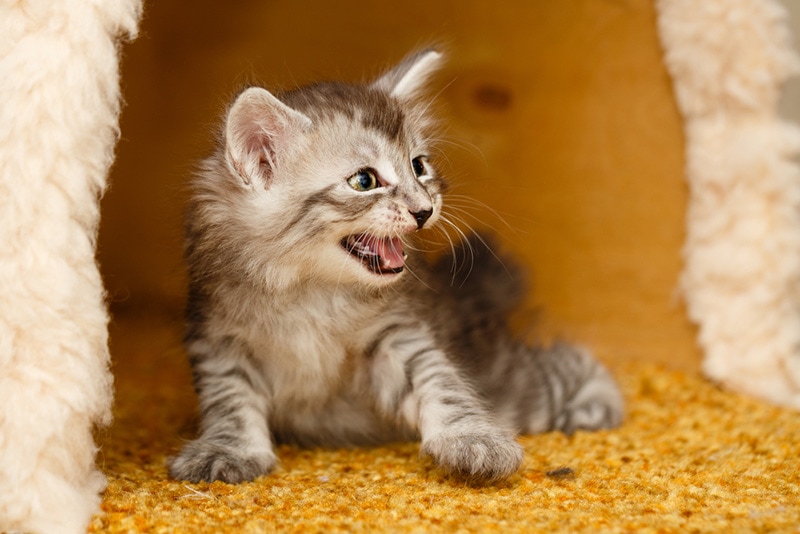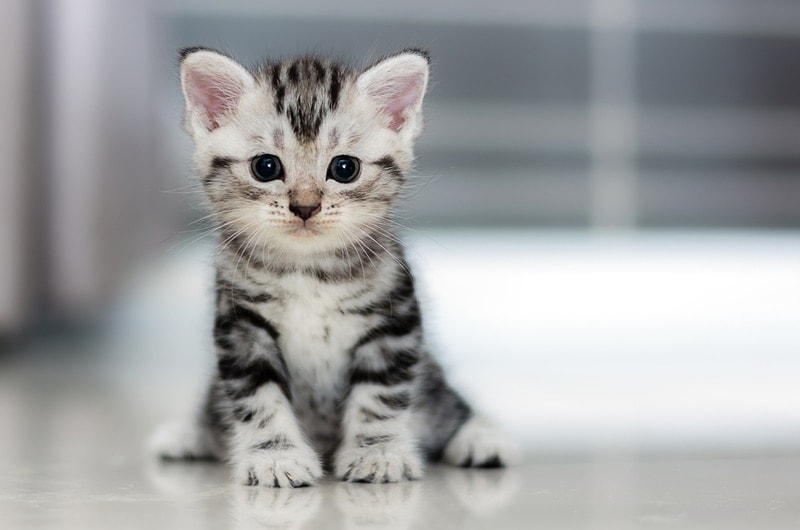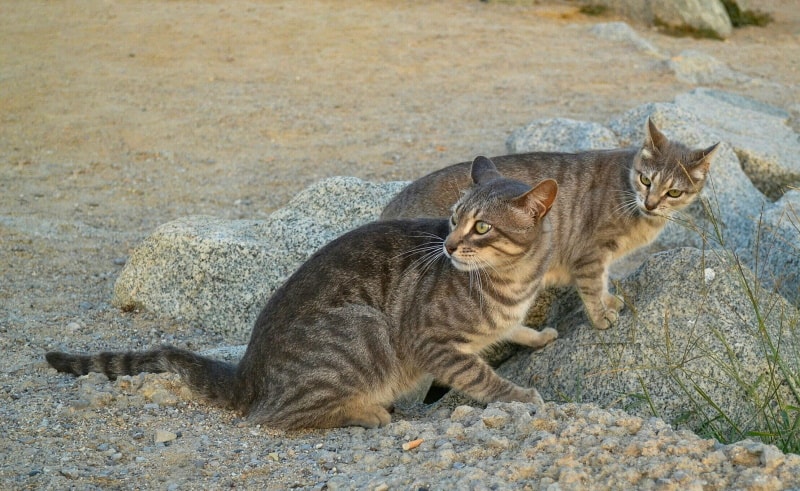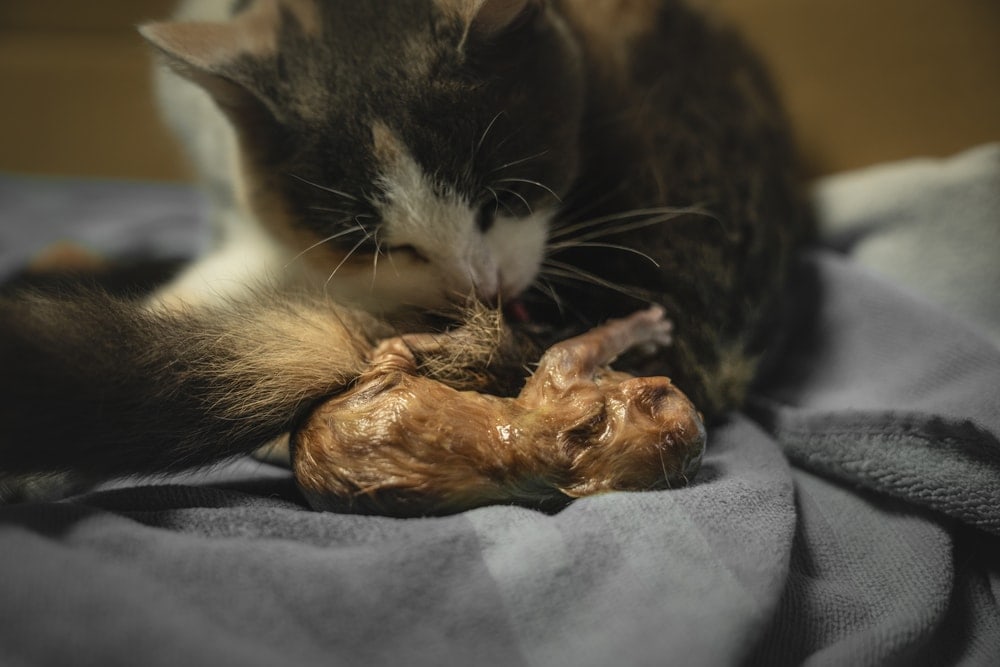Why Is My Kitten Hissing at an Older Cat? 3 Vet-Reviewed Reasons
Updated on

Click to Skip Ahead
Bringing a new kitten home to an already-established resident cat can result in a lifelong friendship. But getting to the good stuff requires careful introductions, lots of patience, and the possibility of dealing with behavior like hissing. It shouldn’t come as a surprise if the older cat in the home hisses at a new kitten at first as they establish dominance and make sure the kitten knows that they’re in charge.
However, some people unexpectedly witness their new kittens hissing at their older, established household cat. There are some reasons why this might happen, and luckily, there are some things you can do to stop the behavior if you witness it yourself.
The 3 Reasons Your New Kitten Might Be Hissing at Your Older Cat
1. Protective Mode
When a kitten is introduced to a new cat that is not their mother or part of the pack they were born with, they can become afraid, and their instincts may drive them to protect themselves. Hissing at a cat they feel intimidated by is their way of warning the cat not to get any closer. It’s a first protective measure that could be followed by raised hair, growling, screaming, and even attacking if the perceived threat does not retreat.

2. Stress or Anxiety
Some kittens feel stressed out or anxious when they’re introduced to a new place and new cats. They don’t understand what is going on, and their mother is no longer around to protect them. This stress and anxiety can result in hissing as a way to relieve said feelings more so than being aggressive toward another cat or person.
3. New Surroundings
Often, new surroundings are enough to make a kitten feel unsure of themselves and like they have no control over their circumstances. Hissing can be a way for them to feel like they are taking some control over what’s happening. So, it might not be the older, established household cat they are hissing at; it could just be their surroundings in general.

What to Do About Your Hissing Kitten
While it’s never ideal to have your new kitten hiss at your older cat, there are some things that you can do to stop the behavior once it has begun. But if you’re yet to bring your new kitten home, there are also some things you can do to prevent the behavior altogether. Here are some things to consider:
Preventing the Hissing Behavior
The first thing you can do to prevent hissing and other aggressive behavior when introducing your kitten to your home with a cat already living in it is to keep the cats separate for a few days. You should set up a room or a separate space for the new kitten to get settled in with dedicated bedding, hiding places, a litter box, a scratching post, food and water dishes, and toys. Try to choose a room that your older cat does not use as much, and let your older cat have free reign of the house.
The cats will smell each other through the door, allowing them to get to know one another. They might hiss and growl a little while doing so, but things should settle down within about a week or so when you know it’s time to introduce them to each other.
The second thing you can do to prevent unwanted hissing and the danger of a catfight is called scent swapping. By using this method, both cats will get used to each other’s scent before meeting physically. There is a greater chance that they will recognize each other as part of the same social group. Once they seem comfortable with the smell of (for example, one another’s bedding), you can allow them to explore their areas. Finally, if they seem relaxed and do not respond negatively to any of the previous steps, you should allow visual contact followed by physical contact. If hissing is still a problem, try again soon.

Putting a Stop to the Hissing Behavior
If you have already introduced your new kitten to your older, established household cat, and hissing is a problem, there are some things you can do to stop the behavior. However, a little hissing (or even hair-raising and growling) is normal for cats when first meeting each other. So, as long as they are not physically attacking each other, give them a couple of days to settle in together, and the behavior should correct on its own.
If the hissing doesn’t stop, consider trying these tactics:
- Make Use of Pheromones: Products such as Feliway Multicat Calming Diffuser kits are designed to mimic the pheromones that mother cats produce to communicate “harmony” to their offspring. This helps them stay calm and relaxed and promotes bonding. Using a pheromone product can help calm your cats at home so they feel less threatened and are more likely to bond and learn how to get along.
- Provide Separate Living Quarters: Make sure each cat has their own space for sleeping, eating, and resting so they don’t feel forced to share. This will help ensure they don’t feel trapped and minimize the chance of fighting for resources. A dedicated space for each cat gives them a place to retreat whenever they want.
- Promote Interactive Play: Get on the floor and start playing with your kitties, encouraging them to interact with one another during the process. If either cat shows no interest or becomes agitated, keep trying until they both engage. This should help start a fun relationship between the two.
- Distract the Kitten: You should always supervise the time your new kitten and older cat spend together until they become friendly and pose no threats to each other. While supervising, distract your kitten whenever they hiss at your older cat. Pull a toy out, make a weird nose that gets their attention, or simply move them away from the space until they stop focusing on the other cat. Always use positive reinforcement and never yell or use physical punishment, as it’s inhumane and will surely cause more problems than were there in the first place.

Final Thoughts
It’s not common, but sometimes new kittens will hiss at older resident cats when introduced to them. The behavior should subside with time, but if it doesn’t, the tips and tricks outlined above should help you get everything under control. If you’re ever in doubt or have questions or concerns, don’t hesitate to ask your veterinarian for their professional and tailored advice.
Featured Image Credit: Sutthiphong Chandaeng, Shutterstock












